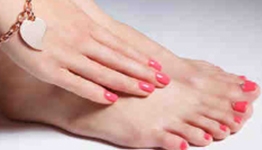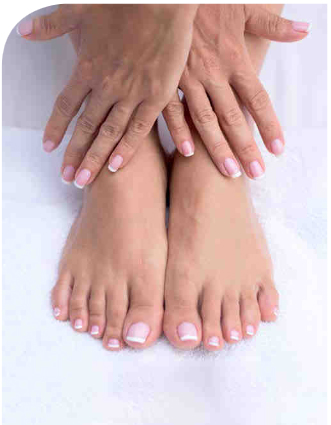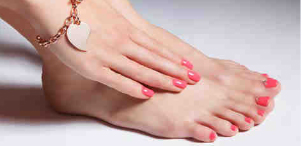Prior to Toenail Surgery


Please consult the Podiatry Department, or GP if out of hours.
If infection is suspected, a daily 5 minutes soak in warm previously boiled water with a handful of salt dissolved in it may help.
Signs of infection are: if the toe becomes red, hot, swollen and painful, possibly with thick, perhaps smelly discharge.
Complications relating to local anaesthesia
- Prolonged numbness – this is unusual but can occur following any local anaesthetic.
- Adverse reaction to local anaesthetic - This can be a mild reaction of the skin to an allergic, anaphylactic or toxic reaction. All precautions to manage this will be in place.
- Pain of the injections - this is often the most uncomfortable part of the procedure. A topical anaesthetic cream will be applied to reduce this.
Although the success rate of the procedure is very high, there is a small chance of nail regrowth.
IMPORTANT
- Please ensure your feet are clean and remove nail varnish from the affected toey Please bring with you extra wide shoes or open toed sandals to accommodate the large dressing which will stay on overnight.
- Please bring a list of your current medication.
- Please eat and drink normally.
- You will be given injections of local anaesthetic into the base of the toe to make the toe numb.
- Please arrive in good time, allowing time to park. Arrange for a lift home-driving as with a numb toe and large dressing on, it could invalidate your insurance, is unsafe and not recommended.
- Allow about an hour for your appointmenty For the first week or so it may be necessary to modify normal activities if they make the toe feel sore.
Due to the chemical burn of the nail bed using phenol, the healing rate can be longer than usual. Average healing time is 8 – 12 weeks after the surgery.
Please inform the Podiatrist if you:
- Have had local anaesthetic within the last 24 hours of nail surgery. If you have, please bring with you details of the type, percentage strength and of local anaesthetic you have had so that we can accurately calculate the maximum safe dosage.
- If you have any allergies or history of reactions to local anaesthetic.y If the redness/infection has spread down your toe. It may not be possible to administer the local anaesthetic.
- Any changes in details or health, or if you are pregnant or breast feeding.
- Are on anticoagulation medication (e.g. Warfarin, Dabigatran, Rivaroxiban, Clopidogrel) or Anti TNF or Oral Retinoids.
- Please get advice from your physician about stopping these medications before the operation. You should continue your normal medication unless you have been advised otherwise.
- You are going on holiday
- Undertaking sporting activities
- Have scheduled operations or treatments such as chemotherapy or radiotherapy
What you can do to make the operation a success?
Lifestyle changes:
- If you smoke, try to stop smoking now. Stopping smoking several weeks before an operation may reduce your chances of getting complications and will improve your long term health.
- Eat a healthy balanced diet including plenty of fluids
- Good blood glucose control if you are diabetic
- Keep active Look after the toe and surger
- site as any trauma to the area or infection can prolong healing time.
What complications can happen?
Surgery is usually safe and effective. However complications can happen. You need to know about them to make an informed decision about your treatment. Knowing about them will also help to detect and treat any problems early.
The Podiatrist will try to make your operation as safe as possible. However, as with any surgery, complications can occur. You should ask your podiatrist if there is anything you do not understand.
Complications relating to the surgery

- Pain at surgery site - Over the counter paracetamol or ibuprofen are normally appropriate, if required. It is advisable to wear extra wide toed sandals/shoes to allow room for the dressing and to relieve pressure from the toe.
- Bleeding - This is usually only minor.
- Infection of the surgical wound - This usually settles with the correct after care and dressings but antibiotics maybe sometimes necessary.



